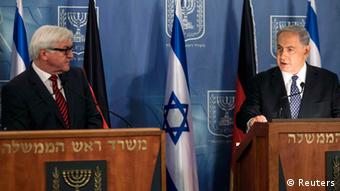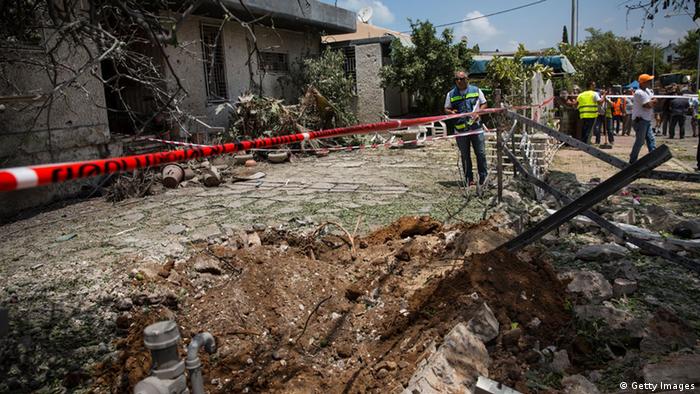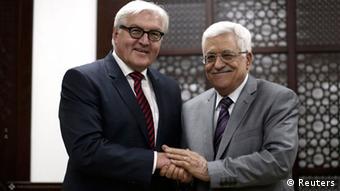Egypt's mediation fails to halt violence
- Details
- Category: Uncategorised
- Created on Wednesday, 16 July 2014 00:00
 Egypt's mediation fails to halt violence
Egypt's mediation fails to halt violence
16 July 2014
The ceasefire that Israel accepted unilaterally only helped briefly as the conflict has restarted on both sides. One Israeli has been killed by Hamas rockets, and the international community can't end the violence.
It didn't help much. By Wednesday morning (16.07.2014) - less than one day after a ceasefire proposed by Egypt was to go in to effect - rockets fired from Gaza continued falling in Israeli and the Israeli military restarted airstrikes against targets in the Gaza Strip.
The Israeli Security Cabinet had accepted Tuesday's proposed ceasefire, but the militant brigades of Hamas and Islamic Jihad continued to fire their rockets at Israel. After six hours of rocket fire, Israel's air strikes resumed, an army spokesman tweeted shortly afterwards. By late evening several rockets had hit Israel.
German Foreign Minister Frank-Walter Steinmeier spoke of the "decisive hours" for diplomacy on Tuesday. He was one of the first European politicians to have arrived in Israel for crisis talks.
"Our role here in the Middle East is not a mediator role," he said. "But we want to show that the safety of Israel and its people is important to us, and secondly we want to search for possibilities and work out how to end the suffering of the civilian population on both sides."
Israeli Prime Minister Benjamin Netanyahu used the foreign support as an occasion to renew his warnings to Hamas. Refusing the ceasefire would cause an "even more intensive military operation," he said, before adding that the international community would offer its fullest support to this proposal. "When there is no ceasefire, our answer is fire," Netanyahu said.
Steinmeier also met Palestinian President Mahmoud Abbas in Ramallah in order to gage what the "role of the Palestinian leadership in Ramallah in the solution to the conflict" could be.

Hamas not consulted?
Meanwhile, Hamas leadership in the Gaza Strip said it was not adequately consulted on Egypt's ceasefire initiative. A Hamas spokesman said the plan was unacceptable, and yet some observers in Gaza said the political leadership in Hamas is still assessing the Egyptian plans.
The wrangling shows how complicated the situation within the organization is. It is unclear who currently has the upper hand - Hamas' political leadership in Gaza or its armed wing, the Al Qassam Brigades. The political leadership abroad wants to have a say too. After eight days of rocket attacks, the military arm of Hamas can boast that it is able to scare Israeli citizens. But the Israeli defense system "Iron Dome" can also boast serious "military successes." And yet on Tuesday night the first Israeli was killed - a man hit by a mortar shell near the Erez border checkpoint.
Ceasefire as a first step
With the Egyptian ceasefire abandoned, the immediate future for the region is unclear. According to media reports, the Egyptian proposal was for all attacks from both sides to be stopped. Only after 48 hours would the delegations begin further negotiations. For Hamas, this is apparently too vague.
The radical Islamic organization has already made its demands - it will not accept a simple return to the status quo, since this will not end the difficult living conditions in Gaza. But the Egyptian government's current proposal does not seem to contain any guarantees for these demands - such as opening the Palestinian-Egyptian border crossings in Rafah or the release of Hamas activists arrested during Israel's military operation in the West Bank in search of the three kidnapped and now dead Israeli teenagers.
The 1.7 million people in the Gaza Strip have been blockaded from Israel for over seven years. The situation worsened further when the new Egyptian government under President Abdel-Fattah el-Sissi cut off the border crossing to Egypt at Rafah and destroyed the tunnels in the border regions.
 The failed ceasefire could provide the Israeli cabinet an opportunity to take stronger military measures. Insiders reported on Tuesday morning's debate in the Israeli Security Cabinet was "stormy." Netanyahu fired Deputy Defense Minister Danny Danon after he repeatedly criticized the prime minister and demanded a ground invasion.
The failed ceasefire could provide the Israeli cabinet an opportunity to take stronger military measures. Insiders reported on Tuesday morning's debate in the Israeli Security Cabinet was "stormy." Netanyahu fired Deputy Defense Minister Danny Danon after he repeatedly criticized the prime minister and demanded a ground invasion.
Foreign Minister Avigdor Lieberman has also not held back with his criticism. He called for the complete re-occupation of the Gaza Strip saying there was "no more time for diplomacy." Lieberman also called on the international community to stand completely behind Israel.
Humanitarian crisis
International and local human rights organizations have warned that the humanitarian situation in the Gaza Strip has deteriorated further. Hospitals are overburdened and basic medical care is under threat. More than 80 percent of the 190 victims of the Israeli air strikes so far have been civilians, the United Nations has said.
On top of that, around 1,000 residential blocks have been damaged or destroyed, and about 17,000 people have sought protection in UN schools. "All the participants seem to be playing football with Gaza and its people," one observer in Gaza said on the phone.
Date 16.07.2014
Author Tania Krämer / bk
Editor Sean Sinico
Source: Deutsche Welle




